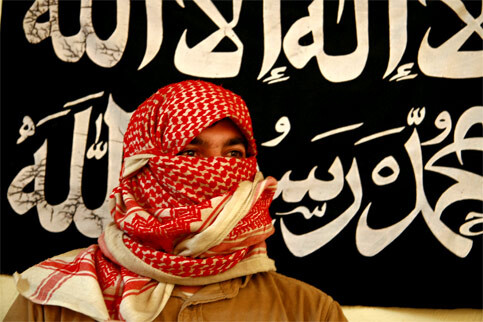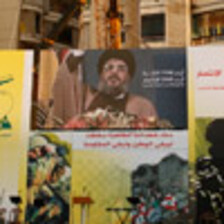Electronic Lebanon 22 May 2007

Fatah al-Islam spokesman Abu Saleem Taher has vowed his group will fight to the death against the Lebanese army and threatened to wreak havoc across the country. (Hugh Macleod/IRIN)
WASHINGTON, May 22 (IPS) - The violence in Lebanon’s Nahr al-Bader Palestinian refugee camp that has killed more than 55 people in the past two days is focusing attention on a relatively unknown and shadowy Islamist group, Fatah al-Islam.
Two bombings in the Lebanese capital Beirut, one Sunday night and one late Monday, also killed one person and injured at least 20. The violence followed the attempted arrest by Lebanese officials of a group robbing a bank in early Sunday.
That confrontation turned into a battle between the Lebanese army and Fatah al-Islam militants in and around the refugee camp, which is home to more than 30,000 Palestinians. The Lebanese Army unleashed a barrage of artillery on the camp in an intensification of the fighting Monday, which has now continued into Tuesday.
Palestinian officials there said nine civilians had been killed.
As the fighting continues, there is a scramble to find out more about the little-known group, which emerged in the refugee camp just north of Lebanon’s northern port city Tripoli in November 2006. With an estimated 300 fighters led by Shakir al-Abssi, the group’s stated objective is to bring the refugee camp under Islamic law before confronting Israel.
Abssi has a history of militancy. The Palestinian-born refugee flew planes for former Palestine Liberation Organisation (PLO) chief Yasser Arafat and was convicted in absentia, along with Abu Musab al-Zarqawi, the former leader of al Qaeda in Mesopotamia, for the 2002 assassination in Jordan of Laurence Foley, a U.S. diplomat. While the group does not appear to be officially linked with al Qaeda, Abssi has declared his sympathy for militant jihad and said he draws inspiration from Osama bin Laden.
Fatah al-Islam is a splinter group of the Syrian-backed Palestinian group Fatah al-Intifada, and the Lebanese government has accused Syria of using the group to foment violence, particularly in advance of the establishment by the U.N. Security Council of an international court to try suspects implicated in the 2005 assassination of former Lebanese Prime Minister Rafik Hariri. However, the precise nature of its ties, if any, with Damascus remains murky.
The Syrian government has strongly denied any connection but, “if you believe in patterns and conspiracies, then you could make a case for why the Syrians would support groups that oppose the (current) anti-Syrian leadership in Lebanon,” according to Michael Hudson, a Lebanon expert at Georgetown University’s Centre for Contemporary Arab Studies.
“[Fatah al-Islam’s] genealogy seems to trace back to the wars of the early 1980s when Syria was trying to set up alternatives to counter (the Muslim Brotherhood),” he told IPS.
However, several experts, Hudson included, asserted that there isn’t any direct evidence of ties to Damascus.
“Lebanese political leaders have ‘played’ to the Sunni Lebanese of the north for many years, seeking their support in the maze of Lebanese politics,” wrote ret. Col. Pat Lang, a former top Middle East analyst for the Pentagon’s Defence Intelligence Agency on his blog, Sic Semper Tyrannis. “Did they think that the Sunni Palestinians in the camps would not hear the same message?” he added, expressing doubt that Damascus would support Sunni extremists.
Indeed, the U.S. investigative journalist Seymour Hersh reported earlier this year in The New Yorker magazine that Fatah al-Islam and other radical Islamist groups in Lebanon were receiving backing from pro-government forces, including Hariri’s son, Saad, presumably to counter Syrian-backed Hezbollah, which has been ascendant since its performance in last summer’s war with Israel. The same groups have also reportedly benefited from contributions by wealthy Sunni donors from Saudi Arabia and the Gulf.
Though small, Fatah al-Islam is very well armed and, according to London Times reporter Nicholas Blanford, seems to have an international network.
One of the fighters killed on Sunday was reportedly part of a terror plot in Germany. Lebanese media has said that it is likely that many of the fighters are not Palestinian, but come from other countries like Lebanon and Saudi Arabia.
The group also seems to have access to media outlets. According to Hudson, the pan-Arab news channel Al Jazeera reported that the group had threatened to expand its attacks beyond Tripoli if the army continued its assault on the camp. Hours later, the second bomb in two days exploded in downtown Beirut.
The refugee camp where Abssi has based his group is one of 12 camps in Lebanon that house a total of more than 200,000 Palestinian refugees.
Most of Nahr al-Bared’s residents are Palestinians who were expelled from the Galilee when Israel was created in 1948, and their descendants. They live in conditions that “are the worst of virtually any refugee population,” according to Samar Assad, executive director of the Palestine Centre in Washington, with no political rights, and little access to jobs, housing or education.
“They have no prospects, zero. People who have no prospects are dangerous,” wrote Lang in reference to Palestinians in Lebanon’s camps. “So, they are susceptible to the takfiri jihadi message and influence drifting on the winds of the internet and in the minds of returned fighters from Iraq. Not surprisingly some of them have accepted the call, the call to drive the foreign, kaffir influence out of Lebanon, the call to vent their rage against a political system that offers them nothing.”
That such a call has become more seductive to Palestinians in the occupied territories, particularly Gaza, as well as in Lebanon, has become a growing concern here, too.
“The only two places in the Arab world where al Qaeda is not present are the West Bank and Gaza,” a State Department official said last week. “The last thing we want is for that to change.”
But some analysts believe al Qaeda is indeed gaining a foothold there, too. “The deteriorating political, security and humanitarian conditions in which Palestinians are living in the Occupied Territory is opening the door to al Qaeda to use Palestinian desperation,” according to Assad, who cited the latest round of fighting in Gaza — both between Fatah and Hamas, and between Hamas and Israel — that has reportedly killed more than 50 people, all but one of them Palestinians.
The growing polarisation in the region underlines the importance of Washington and the West in engaging Hamas, rather than maintaining its diplomatic and economic embargo against the group.
“The fighting around the Palestinian refugee camp in Tripoli with the Lebanese army suggests that the alternative to Hamas is likely to be far more radical al Qaedist elements, such as the Fatah al-Islam group,” said Daniel Levy, a former Israeli peace negotiator currently with the Century Foundation and the New America Foundation here. “It is time to engage with non-al Qaeda Islamists,” he said.
All rights reserved, IPS – Inter Press Service (2007). Total or partial publication, retransmission or sale forbidden.
Related Links


